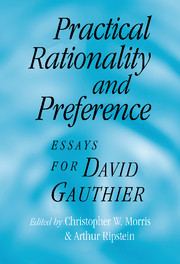Book contents
- Frontmatter
- Contents
- List of Contributors
- Practical Reason and Preference
- What Do Expressions of Preference Express?
- Preference
- Rational Temptation
- Bombs and Coconuts, or Rational Irrationality
- Are Intentions Reasons? And How Should We Cope with Incommensurable Values?
- Two Forms of Practical Generality
- Psychology for Cooperators
- Which Games Should Constrained Maximizers Play?
- The Strategy of Cooperation
- We Were Never in Paradise
Practical Reason and Preference
Published online by Cambridge University Press: 11 January 2010
- Frontmatter
- Contents
- List of Contributors
- Practical Reason and Preference
- What Do Expressions of Preference Express?
- Preference
- Rational Temptation
- Bombs and Coconuts, or Rational Irrationality
- Are Intentions Reasons? And How Should We Cope with Incommensurable Values?
- Two Forms of Practical Generality
- Psychology for Cooperators
- Which Games Should Constrained Maximizers Play?
- The Strategy of Cooperation
- We Were Never in Paradise
Summary
The traditional theory of rational choice begins with a series of simple and compelling ideas. One acts rationally insofar as one acts effectively to achieve one's ends given one's beliefs. In order to do so, those ends and beliefs must satisfy certain simple and intuitively plausible conditions: For instance, the rational agent's ends must be ordered in a ranking that is both complete and transitive, and his or her beliefs must assign probabilities to states of affairs relevant to the achievement of those ends. The requirement of completeness ensures that all alternatives will be comparable; the transitivity condition ensures that at least one alternative will be ranked ahead of the others in each situation. If the completeness condition is violated, the agent will not always be able to compare alternatives and consequently to make a choice. If transitivity is violated, a situation may arise in which the agent will be unable to achieve his or her ends because for any alternative there will be another that will be preferred to it. On the belief side, there are similar requirements of completeness and consistency: An incomplete ordering of beliefs might recommend no action at all, and inconsistent beliefs might recommend incompatible courses of action. Provided that the constraints are satisfied, whenever the opportunity to make a decision presents itself, the rational agent will choose the course of action that will be most likely to achieve his or her ends.
Information
- Type
- Chapter
- Information
- Practical Rationality and PreferenceEssays for David Gauthier, pp. 1 - 10Publisher: Cambridge University PressPrint publication year: 2001
